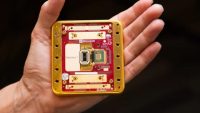Microsoft Calls New Topoconductor a Quantum Breakthrough
February 21, 2025
Microsoft has created a quantum computing chip, Majorana 1, that relies on what it says is a “new state of matter” — one that exists beyond the primary liquid, solid, gas states that have underpinned science since Ancient Greece. Research into this fourth physical existence, called a “topological state,” earned three theoretical physicists the Nobel Prize in Physics in October. Unlike solids, liquids or gases, a topological state is not defined locally by how its particles are arranged, but by how their quantum wavefunction behaves — wrapping around itself globally, across the entire material.
Majorana 1 uses eight topological qubits inside superconductors and also draws on some strengths of traditional semiconductors to create a new kind of quantum chip. This “Topological Core” architecture, designed to scale to a million qubits on a single chip, is the foundation of Majorana 1.

Proclaiming invention of “the world’s first topoconductor,” Microsoft in a news post says it has facilitated “a breakthrough type of material which can observe and control Majorana particles to produce more reliable and scalable qubits, which are the building blocks for quantum computers.”
Microsoft believes this latest development will allow it to build a mainstream quantum computer faster than its competitors (including Google and IBM). “We view this as something that is years away, not decades away,” Chetan Nayak, a Microsoft technical fellow who led the topo team tells The New York Times.
Microsoft detailed its technology in a research paper published in the science journal Nature, which also published its own reporting.
“The company has now created a single device that is part indium arsenide (a type of semiconductor) and part aluminum (a superconductor at low temperatures). When cooled to about 400 degrees below zero, the topoconductor “exhibits a kind of otherworldly behavior that might make quantum computers possible,” NYT explains in a detailed analysis of quantum computing and the role this advance plays.
“Majorana 1 won’t be available through Microsoft’s Azure cloud, but it opens the door to future models with greater capacity that likely will be,” writes CNBC, which says Microsoft is fabricating the Majorana 1 chip itself, here in the U.S., something it can do “because the work is unfolding at a small scale.”
While Microsoft explains in a blog post that its recent research demonstrates “our ability to harness a new type of material and engineer a radically different type of qubit that is small, fast, and digitally controlled,” experts in NYT and Nature point out that while promising, Microsoft’s quantum breakthrough has yet to be operationally deployed.

No Comments Yet
You can be the first to comment!
Leave a comment
You must be logged in to post a comment.